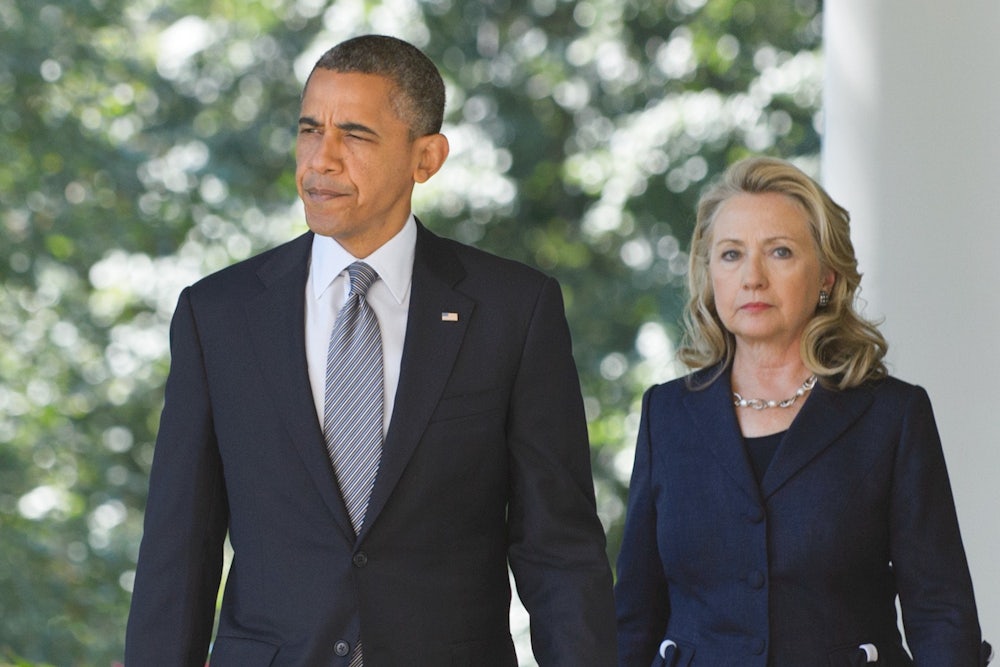Bernie Sanders’s surprisingly robust challenge to Hillary Clinton is indicative of a strange contradiction in Democratic politics, and Clinton is on the losing end of it.
By many accounts, including his own, President Obama believes that electing a Democrat in November is an urgent political priority, both for the country and for the sake of his own legacy. Obama is far and away the most popular and influential Democrat in the country. Were he to make an endorsement in the Democratic primary as a linchpin to that legacy, his value judgment on the point would be widely shared. And yet he hasn’t endorsed anyone in the primary, and appears in no hurry to do so.
Even so, it’s no secret that Obama believes Clinton (the first serious female presidential candidate in American history) rather than Sanders is the proper avatar for championing his legacy. When Politico’s Glenn Thrush asked Obama if he buys into oft-drawn analogy between Sanders’s insurgent campaign and his own run against Clinton in 2008, Obama said, “I don’t think that’s true.” On Wednesday, Obama’s former press secretary Jay Carney confirmed the suspicion, “I don’t think there is any doubt that he wants Hillary to win the nomination and believes that she would be the best candidate in the fall and the most effective as president in carrying forward what he’s achieved.”
Obama’s popularity among Democrats, and the party’s deep investment in his legacy, are the reasons Clinton has aligned herself so closely with Obama on the campaign trail, consistently portraying herself as a tribune for the cause of building on his achievements. It’s the reason she’s a heavy favorite among Democrats who want to write another chapter in the Obama saga, and it’s a line she will almost certainly reprise on Thursday night when she and Sanders meet for their second one-on-one debate.
And yet a very large number of Democrats (including huge majorities of younger, more liberal voters) prefer Sanders to Clinton. As an eminent political figure in her own right, Clinton was bound to find herself crosswise with some Obama supporters. Her support for her husband’s worst-worn initiatives (criminal justice and welfare reform), her vote to authorize the Iraq War, her comfort transacting with financial executives, and her discomfort with owning her own liabilities—all depart from Obama’s more chaste persona. But there are systemic forces behind Clinton’s Catch-22, and she will have a difficult time overcoming them unless Obama ultimately agrees to endorse her formally.
Obama’s enduring popularity with Democrats is partially a testament to triumph in the face of historic hostility. Democrats rightly recall the George W. Bush presidency with revulsion and credit Obama with redeeming the country from it. They think the Affordable Care Act is good, that Obama successfully pulled the economy back from the brink of depression, and that he brought a much-needed level-headedness to U.S. foreign policy that, though still badly flawed, has improved the country’s standing in the world.
Obama’s mythos is elemental to his appeal. Take it away, and the political durability of his America becomes much shakier. Obama did save the country from depression, but he didn’t preside over economic boom times. The Affordable Care Act is a triumph, but it has not made health insurance universal, or eliminated crippling exposure to high medical costs. The economy has improved, but economic anxiety (the real kind, not the kind that’s used to explain away pervasive racism) is still very much with us. And wages have only recently started to climb, and slowly.
The partial successes of the Obama era have saddled Clinton with a reverse Goldilocks dilemma. If (through greater stimulus, more aggressive Federal Reserve nominees, or dumb luck) he had presided over a more rapid and broadly shared recovery, or had managed to squeeze more radical reforms out of the political system, then Clinton’s pledge to build upon his legacy would be more resonant. She’d be better able to convert his popularity into her own. Instead, doubling down on the transactional facets of his presidency seems uninspiring.
By contrast, had Obama struggled more mightily than he did, Clinton’s appeal to hard-nosedness, and her leeriness of high-minded idealism, would be easier to sell. Obama personified the allure of hope over process; if he’d been a less prolific president, Clinton could promise better results with fresh tactics. Instead, Obama’s record is superficially consistent with the hypothesis that a president like Sanders, with greater faith in and commitment to people-driven politics, could do even better than Obama’s done.
The Democratic primary is thus in some sense testing the degree to which outcomes rather than narratives explain Obama’s popularity—and thus how sticky and transferable it actually is. In the long run, and precisely because Obama has been a success in Democrats’ eyes, Clinton will probably get the better of Sanders. But those who take a different view are by no means deluded. This is a very tough sell for Clinton, and only Obama can make it easier.
